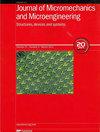微加工自振荡流体热机(SOFHE)的毛细管强化相变
IF 2.1
4区 工程技术
Q2 ENGINEERING, ELECTRICAL & ELECTRONIC
引用次数: 0
摘要
本文报道了用于热能收集的自振荡流体热机(SOFHE)的小型化版本的设计,制造和表征。这种新设计包括方形截面的毛细角,以及底部壁上的蚀刻毛细路径,由于增强的相变,在稳定性和机械功率方面提高了性能。该发动机由一个被困在微通道中的蒸汽泡组成,该微通道是由一个振荡的液体塞(充当活塞)通过蒸汽泡中的周期性蒸发和冷凝而启动的。振荡的基本物理原理类似于单支脉动热管。该通道通过阳极连接有槽的玻璃晶圆(顶部和侧壁)到硅晶圆(底壁)来微制造。为了进一步增加相变,在底部壁上制作了两个具有蚀刻毛细管路径的通道,宽度分别为25和50 μ m,深度为100 μ m。这是第一个小型化的SOFHE,可以在毫米范围内产生可靠的振幅。通过测量汽泡体积和频率的变化,利用液塞上的动量平衡计算出压力的变化,进而计算出做功、机械功率和功率密度。我们观察到,在宽度为50µm处添加蚀刻毛细路径增加了振幅(从1.6到4 mm),导致产生的功率增加了五倍(从8到40µW)。这项研究为设计不同的吸芯结构开辟了一条新的道路,以最大限度地提高SOFHE的振幅和功率密度,使其成为一种有前途的热能收集器,为无线传感器供电。本文章由计算机程序翻译,如有差异,请以英文原文为准。
Capillary enhanced phase change in a microfabricated self-oscillating fluidic heat engine (SOFHE)
This paper reports the design, fabrication, and characterization of a miniaturized version of a self-oscillating fluidic heat engine (SOFHE) for thermal energy harvesting. This new design includes capillary corners of a square cross-section, as well as an etched capillary path on the bottom wall that improves the performance in terms of stability and mechanical power owing to the enhanced phase change. The engine consists of a vapor bubble trapped in a microchannel by an oscillating liquid plug (acting as a piston) set in motion by periodic evaporation and condensation in the vapor bubble. The underlying physics of the oscillations is similar to those of a single-branch pulsating heat pipe. The channel is microfabricated by anodically bonding a grooved glass wafer (top and sidewalls) to a silicon wafer (bottom wall). To further increase the phase change, two more channels are fabricated with an etched capillary path on the bottom wall at two different widths of 25 and 50 µm and a depth of 100 µm. This is the first miniaturized SOFHE that generates a reliable amplitude in the millimeter range. By measuring the change in the volume of the vapor bubble and the frequency, we calculated the change in pressure using the momentum balance on the liquid plug, and then calculated the work, mechanical power, and power density. We observed that the addition of the etched capillary path at a width of 50 µm increased the amplitude (from 1.6 to 4 mm) leading to a fivefold increase in the generated power (from 8 to 40 µW). This study opens a new path towards designing different wicking structures to maximize the amplitude and power density of the SOFHE, making it a promising thermal energy harvester to power wireless sensors.
求助全文
通过发布文献求助,成功后即可免费获取论文全文。
去求助
来源期刊

Journal of Micromechanics and Microengineering
工程技术-材料科学:综合
CiteScore
4.50
自引率
4.30%
发文量
136
审稿时长
2.8 months
期刊介绍:
Journal of Micromechanics and Microengineering (JMM) primarily covers experimental work, however relevant modelling papers are considered where supported by experimental data.
The journal is focussed on all aspects of:
-nano- and micro- mechanical systems
-nano- and micro- electomechanical systems
-nano- and micro- electrical and mechatronic systems
-nano- and micro- engineering
-nano- and micro- scale science
Please note that we do not publish materials papers with no obvious application or link to nano- or micro-engineering.
Below are some examples of the topics that are included within the scope of the journal:
-MEMS and NEMS:
Including sensors, optical MEMS/NEMS, RF MEMS/NEMS, etc.
-Fabrication techniques and manufacturing:
Including micromachining, etching, lithography, deposition, patterning, self-assembly, 3d printing, inkjet printing.
-Packaging and Integration technologies.
-Materials, testing, and reliability.
-Micro- and nano-fluidics:
Including optofluidics, acoustofluidics, droplets, microreactors, organ-on-a-chip.
-Lab-on-a-chip and micro- and nano-total analysis systems.
-Biomedical systems and devices:
Including bio MEMS, biosensors, assays, organ-on-a-chip, drug delivery, cells, biointerfaces.
-Energy and power:
Including power MEMS/NEMS, energy harvesters, actuators, microbatteries.
-Electronics:
Including flexible electronics, wearable electronics, interface electronics.
-Optical systems.
-Robotics.
 求助内容:
求助内容: 应助结果提醒方式:
应助结果提醒方式:


